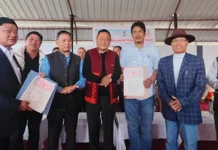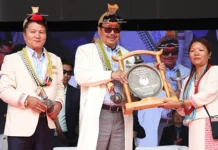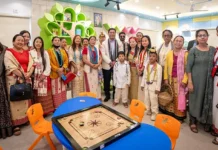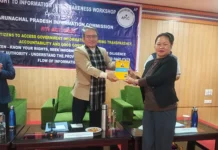ZIRO, 16 Dec: Fisheries Minister Tage Taki said that pisciculture in the state is undergoing a “paradigm shift towards attaining self-sustenance in scientific fish production.”
The minister said this during the inauguration of a two-day ‘workshop-cum-training programme’ organised by the ICAR’s Bhubaneswar (Odisha)-based Central Institute of Freshwater Aquaculture (CIFA), in collaboration with the state’s fisheries department, here in Lower Subansiri district on Wednesday.
Taki urged the farmers to acquaint themselves with the latest technology for fish farming developed by the CIFA to double their income and make pisciculture a sustainable venture.
He said that, “with the revolution in fish farming taking place during the last three years, the state is reckoned to become self-sufficient in fish and seed production in the coming years,” and assured to provide quality fish seeds and feeds at reasonable prices to enhance fish production in the state.
CIFA principal scientist Dr SK Swain said that “the first workshop of such a kind in the state is a platform to interact with the fish farmers and officers of the fisheries department to channel the intervention by ICAR through technical inputs and knowledge dissemination for growth of sustainable fishery sector.”
Along with Dr Swain, CIFA scientists Drs PP Chakraborty and KD Mahapatra interacted with fish farmers and expressed satisfaction over the healthy growth of the Amur carp “in the paddy-cum-fish culture which ranges from 300 to 400 gms in three to four months, which is far better than the common carp.”
Fisheries Deputy Director N Pussang also spoke.
The farmers requested the CIFA to demonstrate the breeding of the Amur carp in the next breeding season “to produce quality seeds for replacement of existing varieties of common carp culture presently practiced in the paddy-cum-fish culture in Ziro valley.” They requested also for demonstration of pangasius culture.
Dr Chakraborty stressed on “integration of fish farming with pig, duck, poultry and dairy to reduce the cost of supplementary feeding and for faster growth of fishes from a unit area, thereby doubling the fish production and income of farmers.”
He also made a detailed presentation on nutrients management in freshwater aquaculture.
Dr Mahapatra made a presentation on the importance of broodstock management for quality seed production, and spoke about the problems associated with “inbreeding depression in carps,” while Dr Ferosekhan made a presentation on the breeding culture of magur and pangas catfishes.
Among others, the district fisheries development officer and officers from the fisheries directorate participated in the programme. (DIPRO)




